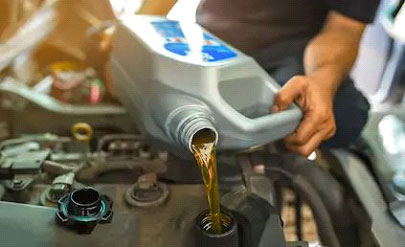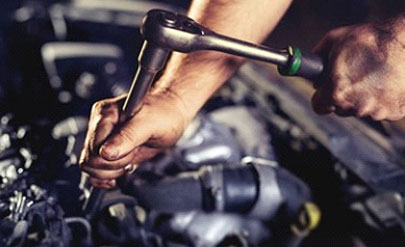It’s 9:30 in the morning on a Wednesday. You get a call from one of your drivers, saying his vehicle has recently been making a loud, squealing noise. Now, he’s on the side of the road waiting for a tow truck. Ugh! Over an hour later, he calls again with the news that your go-to technician is fully booked, but they’ll try to squeeze your vehicle in. Unfortunately, it’s not even looked at until 3:00 PM, and the diagnosis doesn’t come until 4. Bad news: the alternator is damaged. The cost is already piling from the tow service, not to mention and entire day of postponed deliveries. The tech goes on to say the issue stemmed from a busted drive belt, but this vehicle is the lifeline for tomorrow’s deliveries. So, what choice do you have?
Many parts of this situation could have been avoided. Your driver could’ve alerted you when the noises first started, which would’ve saved the alternator (and hundreds of dollars). A well-managed maintenance program could have fixed the damaged drive belt during scheduled preventive maintenance/oil change for $75, but now you’re stuck paying hundreds. You may console yourself by thinking of this costly repair as an “investment” in the vehicle’s future, but this doesn’t guarantee it a longer lifespan.
When you stay on top of fleet maintenance, your fleet operations run smoothly. Your drivers are happier, and you can control vehicle maintenance cost. It is key to incorporate a properly managed maintenance program into your operations. The right program ensures your company’s vehicles are taken care of in a timely and appropriate manner. You need a partner that is powered by data, enterprise, and telematics to mitigate mechanical issues. You need someone that will maximize efficiency and help improve your driver’s safety. “Best-In-Class” managed maintenance programs are part of a successful fleet operation.
PRIORITIZEd PREVENTIVE MAINTENANCE 
It’s estimated that over 75% of repair shop customers who ignore recommended maintenance plans could save at least $100 per visit just by properly maintaining their vehicles. This, “if it ain’t broke, don’t fix it”, mindset is not only dangerous but expensive. Unplanned maintenance can cost at least 3x more than scheduled upkeep. In other words, postponing that oil change can cause up to $6,000 worth of damage later on. You can save your vehicle by complying to preventive maintenance.
When you don’t prioritize preventative maintenance, you’re not only losing money, but also valuable time. Unforeseen damages lead your driver to waste hours at the side of the road and tied up at a shop…not to mention the vehicle itself can be out of commission for days. And who wants to spend profits on an emergency rental?
WE STAY UP TO DATE ON THE NEEDS OF YOUR FLEETS
MAKE & MODEL 
Do you know how many of your vehicles can wait 10,000 miles before an oil change? Or which vehicles need a transmission fluid changed way before 100,000 miles? Knowing what your unique models/engine types need can be the difference between going in for scheduled preventive maintenance, versus dealing with a full engine breakdown.
Knowing about each individual vehicle can also avoid a mechanic trying to upsell you in repairs. Not to our surprise, two out of three U.S. drivers distrust auto repair shops to give them a fair price. The labor rates you’re charged, along with the price of parts, should always fall in line with industry benchmarks. That takes additional knowledge, time, and research. When truly understanding the intricacies of each of your fleet vehicles, you’re ensuring the right maintenance decisions are being made.
What to look for in a technician:
You may like the mom-and-pop shop down the road, but that doesn’t necessarily mean they’re up to date on how to reprogram your vehicle. When turning to a maintenance management program run by Veteran Fleet Managers and ASE-certified technicians, you know you’re in the right hands. You’ll be working with a pre-negotiated, authorized network with the expertise to make the right call. We know the ins and outs of this industry, like a sports teammate becoming the coach. We not only have and use the data on hand, we also have firsthand experience with repairs and fleet management to ensure your fleet stays at its optimal level of service.
MAINTENANCE DATA TO THE RESCUE
With so many other things to juggle, many companies with fleets don’t have the time, resources, or infrastructure to track fleet data. In many cases, office managers often keep meaningless data in a spreadsheet they rarely make changes to; data tracking simply doesn’t exist. But if you have an expert to help start tracking data—a Fleet Manager in your back pocket looking out for your best interest—you’d see just how valuable the numbers can be to your bottom line. We capture that expert data for informed benchmarking to offer a better idea of your fleet vehicles’ true-life cycle, interpreting that data into cost savings, and providing actionable insights:
- Incorporate & Manage Maintenance Program – Getting your fleet onto a PM program is only the beginning. Our trained fleet expert will keep your PM program on track for you, keep you up to date for all your upcoming services and needs in advance, so we can schedule accordingly, reducing those unwanted repairs and service down time putting those dollars back in your pocket.
- Track how much you’re spending on a Cost Per Unit (CPU) Basis — We will track key Uptime, Down Time, and Repair Type metrics to help you better understand what is impacting your bottom line financially. When you have numbers to compare one vehicle’s repair and maintenance record cost to another, you learn vehicle and driver behaviors that can then be managed and coached so you can make better business decisions about your fleet.
- When to cycle out your vehicle — Our trained fleet experts can use maintenance data to better develop cycle strategies. For example — data experts can see that one fleet’s cargo vans regularly start incurring major repairs at 150,000 miles. Instead of racking up bills with costly and inevitable fixes, a data expert can recommend cycling out these vehicles before they reach a certain mileage.












